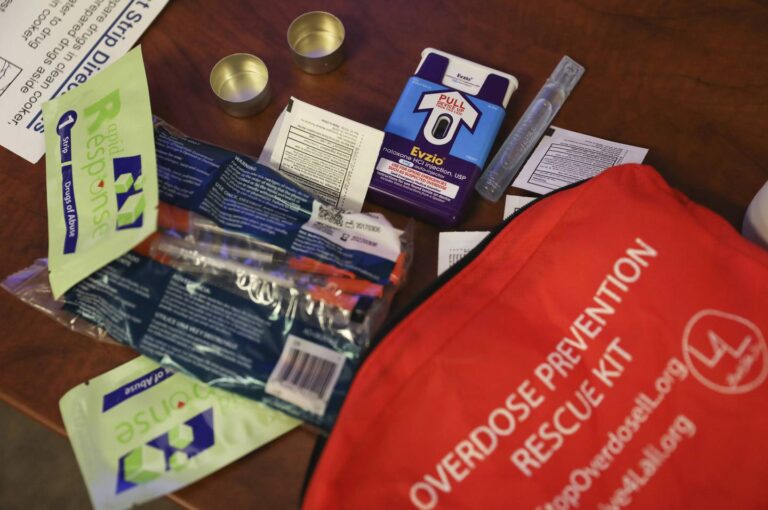Nineteen Illinois counties, including five of six in the Chicago area, are suing some of the nation’s largest pharmacy chains, alleging the companies contributed to the overdose crisis by failing to monitor and restrict improper prescriptions.
The lawsuit, filed last week in Cook County, adds to the growing pile of opioid litigation being pursued by state and local governments against drug manufacturers, distributors and retailers.
Advertisement
The plaintiffs in the pharmacy lawsuit include all counties in the Chicago area except Lake. A spokeswoman for Lake County State’s Attorney Eric Rinehart said the county, which is represented by a different law firm than the one used by the other counties, is considering its own litigation.
The counties allege pharmacies run by Walgreens, CVS, Kroger, Meijer, Albertsons and Walmart “failed to design and operate systems to identify suspicious orders of prescription opioids, maintain effective controls against diversion and halt suspicious orders when they were identified, and instead actively contributed to the oversupply of such drugs and fueled an illegal secondary market.”
Advertisement
The lawsuit says some of the chains used performance metrics that encouraged pharmacists to fill prescriptions without questioning whether they were legitimate — a sign the companies “put profits over safety.”
Jim Cohn, spokesman for Deerfield-based Walgreens, disputed the allegations.
“As we have said throughout this process, we never manufactured or marketed opioids nor did we distribute them to the ‘pill mills’ and internet pharmacies that fueled this crisis,” he said in a statement. “We will continue to defend ourselves against the unjustified attacks of plaintiffs’ lawyers on the professionalism of our pharmacists, who are dedicated health care professionals that live and work in the communities they serve.”
In similar cases being tried elsewhere in the country, attorneys for some pharmacy chains have argued that blame should be placed with the doctors who prescribed the drugs, not the druggists who filled the orders.
The counties’ lawsuit, though, argues the pharmacies had enough information to have viewed some doctors and patients with suspicion. The red flags allegedly included patients getting multiple prescriptions from the same doctor, patients getting prescriptions from different doctors, orders of unusual size and frequency and orders disproportionately paid for in cash.
The complaint does not ask for a specific amount in damages, though it says the opioid crisis has cost Illinois’ criminal justice system about $50 million a year.
One of the plaintiffs, McHenry County State’s Attorney Patrick Kenneally, said the pharmacies, like drug manufacturers and distributors, stood by while a flood of opioid pills caused a spike of addiction and overdoses.
“They were supposed to be the sentinel at the end of this (distribution) chain that had an interest to make sure (opioids) were prescribed for a legal purpose,” he said. “They failed to do that. As a result of that failure, they’ve got to be held responsible and help clean up this mess.”
Advertisement
He said the counties took into account the success other jurisdictions have had suing pharmacy chains. Last week, for example, a judge in Ohio ordered CVS, Walgreens and Walmart to pay two counties more than $650 million.
Local governments in Illinois have been engaged in litigation with the pharmaceutical industry for years, and some of those efforts have begun to get results.
In February, the state announced a deal with three drug distributors and drugmaker Johnson & Johnson that will allow most of the state’s counties and municipalities to share in a $760 million settlement.
Illinois Attorney General Kwame Raoul also announced tentative agreements last month with drug manufacturers Allergan and Teva, which he and colleagues in other states have accused of deceptively marketing opioids by downplaying the risk of addiction.
The total settlements work out to $6.6 billion nationwide, though Illinois’ cut has not been specified.
On Monday, Raoul announced a “significant victory” in yet another opioid-related case, this one involving the manufacturer of an addiction treatment medication called Suboxone.
Advertisement
The medication is used to quell the craving for opioids, and Raoul and other attorneys general say the manufacturer, Indivior, unlawfully blocked competitors from developing generic alternatives, leaving people to pay artificially high prices.
The judge in the case denied Indivior’s request for summary judgment, meaning the lawsuit can move forward.

Afternoon Briefing
Daily
Chicago Tribune editors’ top story picks, delivered to your inbox each afternoon.
Opioid prescriptions in the U.S. have plunged since reaching a high of 255 million in 2012. In 2020, the last year for which the Centers for Disease Control and Prevention has data, only 143 million prescriptions were issued.
Deaths related to opioids, however, have continued to soar. Experts say most of that is due to illicit fentanyl, not pharmaceuticals, but Dr. Daniel Ciccarone, the Justine Miner professor of addiction medicine at the University of California San Francisco, argues the phenomena are related.
He said the crisis began with an overabundance of prescription painkillers, which led to many pills being diverted to the street. When that supply contracted, some pill users moved on to heroin and then fentanyl, a synthetic opioid traffickers came to favor because it is cheap, potent and easy to smuggle.
He said the latest wave involves people mixing stimulants like cocaine and methamphetamine with opioids, an especially dangerous combination.
Advertisement
“What would have happened in the absence of the opioid pill oversupply?” Ciccarone said. “My expert opinion would be none of the (successive waves) would have happened, or would have happened in a much more minor way.”







